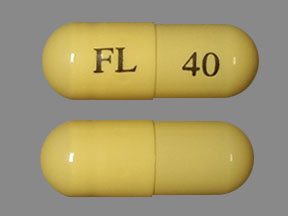Fetzima and Alcohol/Food Interactions
There are 2 alcohol/food/lifestyle interactions with Fetzima (levomilnacipran).
Levomilnacipran Food
Moderate Food Interaction
Alcohol can increase the nervous system side effects of levomilnacipran such as dizziness, drowsiness, and difficulty concentrating. Some people may also experience impairment in thinking and judgment. You should avoid or limit the use of alcohol while being treated with levomilnacipran. Do not use more than the recommended dose of levomilnacipran, and avoid activities requiring mental alertness such as driving or operating hazardous machinery until you know how the medication affects you. Talk to your doctor or pharmacist if you have any questions or concerns.
Levomilnacipran High Blood Pressure (Hypertension)
Moderate Potential Hazard, Moderate plausibility
SNRI antidepressants - hypertension
Selective serotonin and norepinephrine reuptake inhibitor antidepressants (SNRIs) have been associated with sustained increases in blood pressure. Therapy with SNRI antidepressants should be administered cautiously in patients with preexisting hypertension. Blood pressure should be assessed prior to initiating treatment and monitored regularly. The dose should be reduced or discontinued if necessary.
References
- (2001) "Product Information. Effexor (venlafaxine)." Wyeth-Ayerst Laboratories
- (2004) "Product Information. Cymbalta (duloxetine)." Lilly, Eli and Company
- (2008) "Product Information. Pristiq (desvenlafaxine)." Wyeth Laboratories
- (2009) "Product Information. Savella (milnacipran)." Forest Pharmaceuticals
- (2013) "Product Information. Fetzima (levomilnacipran)." Forest Pharmaceuticals
Fetzima drug interactions
There are 368 drug interactions with Fetzima (levomilnacipran).
Fetzima disease interactions
There are 8 disease interactions with Fetzima (levomilnacipran) which include:
- depression
- renal disease
- glaucoma
- hypertension
- hyponatremia
- mania
- seizures
- urinary tract obstruction
More about Fetzima (levomilnacipran)
- Fetzima consumer information
- Check interactions
- Compare alternatives
- Pricing & coupons
- Reviews (197)
- Drug images
- Side effects
- Dosage information
- During pregnancy
- FDA approval history
- Drug class: serotonin-norepinephrine reuptake inhibitors
- Breastfeeding
- En español
Related treatment guides
Drug Interaction Classification
| Highly clinically significant. Avoid combinations; the risk of the interaction outweighs the benefit. | |
| Moderately clinically significant. Usually avoid combinations; use it only under special circumstances. | |
| Minimally clinically significant. Minimize risk; assess risk and consider an alternative drug, take steps to circumvent the interaction risk and/or institute a monitoring plan. | |
| No interaction information available. |
Further information
Always consult your healthcare provider to ensure the information displayed on this page applies to your personal circumstances.


